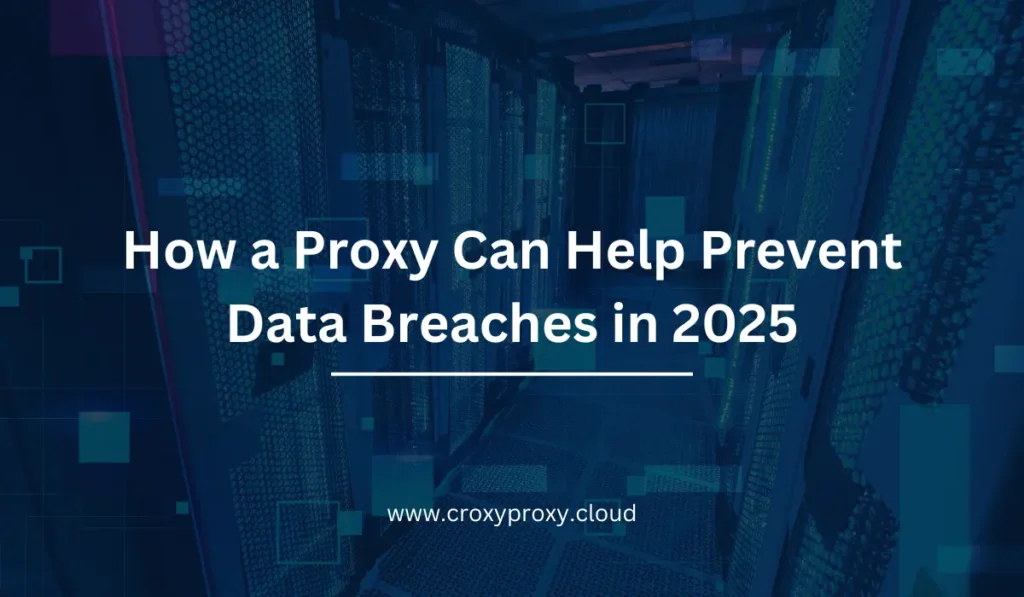
In today’s digital world, internet security and privacy are more important than ever. Every time we browse the web, our computer connects directly to websites, exposing our IP address and online activities. But what if we want to stay anonymous or access restricted content? This is where a proxy server comes into play.
A proxy server acts as a middleman between a user and the internet. Instead of connecting to a website directly, your request first goes through the proxy server. It then forwards your request to the website, fetches the response, and sends it back to you. This process adds a layer of security, privacy, and sometimes even speeds up browsing. But how exactly does a proxy server work, and why should you use one? Let’s explore in detail.
What is a Proxy Server?
A proxy server is a computer or a system that acts as an intermediary between your device and the internet. When you visit a website, your device usually sends a request directly to the web server, but with a proxy, this request first goes through the proxy server before reaching the destination.
Think of it like a receptionist in an office. Instead of letting visitors go directly to employees, the receptionist first checks their details and then connects them to the right person. Similarly, a proxy server handles your web requests and forwards them appropriately.
How Does a Proxy Server Work?
The working of a proxy server is quite simple. Here’s how it works step by step:
- You send a request – When you enter a website URL in your browser, your computer sends a request to the proxy server instead of connecting directly to the website.
- Proxy processes the request – The proxy server checks and modifies the request based on its settings, such as filtering restricted content or hiding your IP address.
- Proxy forwards the request – The proxy then forwards the request to the actual website.
- Website responds – The website processes the request and sends the response back to the proxy server.
- Proxy sends the data to you – The proxy receives the website’s response and forwards it to your computer, making it appear as if the proxy itself accessed the site.
Since your original IP address remains hidden, websites only see the proxy server’s address, enhancing privacy and security.
Types of Proxy Servers
Proxy servers come in different types, each serving a specific purpose. Some common types include:
- Forward Proxy – Used by individual users or organizations to filter content and secure web access.
- Reverse Proxy – Placed in front of web servers to handle incoming traffic, improving security and performance.
- Transparent Proxy – Does not hide your IP address and is mostly used for content filtering, like in schools and offices.
- Anonymous Proxy – Hides your IP address but informs websites that a proxy is being used.
- High Anonymity Proxy – Completely hides both your IP address and the fact that a proxy is in use.
Why Should You Use a Proxy Server?
Using a proxy server can provide several benefits, including:
1. Increased Privacy
One of the main reasons people use proxy servers is to hide their IP address. This prevents websites from tracking their online activities and protects personal data from hackers and advertisers.
2. Better Security
Proxies add an extra layer of security by filtering harmful websites, blocking malicious traffic, and even encrypting your data to prevent cyber threats.
3. Access Restricted Content
Some websites and streaming services have geographical restrictions. A proxy server can help bypass these restrictions by making it appear as if you’re browsing from a different location.
4. Faster Browsing and Caching
Some proxy servers store copies of frequently accessed web pages (caching), reducing the time it takes to load them. This can improve browsing speed and reduce bandwidth usage.
5. Control Over Internet Usage
Organizations, schools, and parents use proxies to monitor and restrict internet usage, blocking inappropriate content or limiting access to social media and entertainment sites during work or school hours.
Drawbacks of Using a Proxy Server
Despite their benefits, proxy servers have some limitations too:
- Not Always Secure – Some free or poorly configured proxies do not encrypt data, making them vulnerable to hackers.
- Reduced Speed – Since a proxy acts as a middleman, it can slow down internet speed due to the extra processing time.
- Blocked by Some Websites – Some websites detect and block proxy traffic, preventing access.
- Privacy Concerns – If you use an untrustworthy proxy, your browsing data could be logged and misused.
Proxy Server vs VPN: What’s the Difference?
Many people confuse proxies with VPNs (Virtual Private Networks). While both help with privacy, they work differently:
| Feature | Proxy Server | VPN (Virtual Private Network) |
|---|---|---|
| Privacy | Hides IP address but does not encrypt traffic | Encrypts entire internet traffic for complete anonymity |
| Security | Basic security, may not be fully encrypted | Highly secure with encryption |
| Speed | Can be faster, but depends on configuration | May slow down due to encryption |
| Usage | Best for bypassing restrictions and accessing blocked content | Best for complete security and privacy |
For complete online security, using a VPN is a better option, but for general privacy and unblocking content, a proxy server is sufficient.
How to Set Up a Proxy Server
If you want to use a proxy, you can set it up on your device:
- On Windows:
- Go to Settings > Network & Internet > Proxy
- Enter the proxy address provided by your service.
- On macOS:
- Go to System Preferences > Network
- Select your connection and go to Advanced > Proxies
- Enter the proxy details.
- On a Browser (Chrome/Firefox):
- Open browser settings and search for Proxy
- Enter the proxy details manually.
Many paid and free proxy services are available online, but always choose a reliable one to ensure security.
Conclusion
A proxy server is a great tool to enhance privacy, security, and internet access. It acts as a bridge between your device and the web, helping you stay anonymous, access restricted content, and even speed up browsing. However, it is not a foolproof security solution. If you need complete anonymity and protection, a VPN is a better choice.
Understanding proxy servers and their functions can help you make better decisions about internet security. Whether for personal or business use, proxies can be an essential part of your online experience.



